- Home
- Technical Cooperation Projects
- Index of Countries
- Africa
- All Africa
- Project on Capacity Development for Trade Facilitation and Border Control in East Africa
- Project News
- The 4th Project Regional Joint Coordinating Committee (RJCC) was held in Bujumbura, Burundi
Project News
2020-01-30
The 4th Project Regional Joint Coordinating Committee (RJCC) was held in Bujumbura, Burundi
On 30 January 2020, the 4th Regional Joint Coordinating Committee (RJCC) of the Project (Project on Capacity Development for Trade Facilitation and Border Control in East Africa) was held in Bujumbura, Burundi. The RJCC participants include the Commissioners General and Commissioners Customs of the East African Revenue Authorities (EARAs), where they serve as the Project Directors and Project Managers of this technical cooperation project, as well as the senior officials who are involved in the implementation of this Project, representatives from the Directorate of Customs of the East African Community (EAC) Secretariat, JICA Headquarters, JICA Rwanda and Burundi Offices, WCO (World Customs Organization), etc.. In addition, two UNOPS (United Nations Office for Project Services) regional office representatives in charge of the grant aid project, who will implement the grant aid project in line with this technical cooperation project, and other delegates, including the delegates from South Sudan National Revenue Authority, participated in as observers.
The meeting was opened by the Commissioner General of Burundi Revenue Authority (Office Burundais des Recettes or OBR) as the host of the meeting and he expressed his gratitude for the support of capacity building extended to date under this Project. In the main session, the Project Chief Advisor noted that the progress report adopted by TICAD[1] 7, which was held in Yokohama, Japan, last August, clearly recognized the good efforts done by the Revenue Authorities, and that the TICAD 7 Action Plan included (i) strengthening connectivity through quality infrastructure investment by improving the capacity of authorities related to border crossing, and (ii) supporting Africa's efforts to promote peace and security through capacity building of central and local governments to improve border management and surveillance. He further shared the progress and the planned activities for Customs capacity building component of the Project.
The Team Leader of the OSBP (One-Stop Border Post) component of the Project shared the results of activities and the planned activities at the Rusmo, Namanga, Malaba, Gatuna/Katuna borders, which are the target borders for OSBP operationalization and monitoring under the Project.
Following the discussions, the participants reviewed the project monitoring sheet that reflected inputs from each Revenue Authority and adopted it.
At the end of the meeting, Chief Advisor announced the best performing Master Trainers for Year 2019. The Master Trainers had been trained under the Project to be "Trainers" in the areas of Customs valuation, HS classification and Intelligence Analysis and subsequently contributed to capacity building through training of officers and stakeholders in the region last year. It should be noted that the number of trainees trained by those Master Trainers reached about 6,000, which is about the same for Year 2018, which make it a total of 12,000 people have been already benefited from their efforts the last two years alone. In addition, the Project recognized Rwanda Revenue Authority (RRA) for their significant efforts to utilize Master Trainers for training as well as the EAC Secretariat, for their long-standing cooperation and support to the Project.
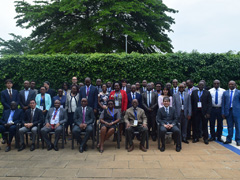
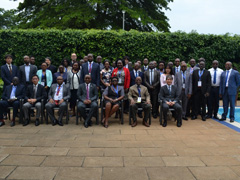
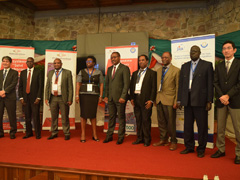
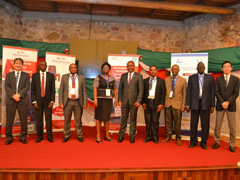
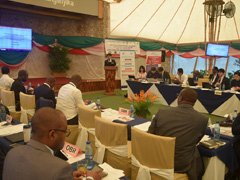
Note
- [1] Tokyo International Conference on African Development is a conference held regularly with the objective "to promote high-level policy dialogue between African leaders and development partners." Japan is a co-host of these conferences
- About JICA
- News & Features
- Countries & Regions
- Our Work
- Thematic Issues
- Types of Assistance
- Partnerships with Other Development Partners
- Climate Change / Environmental and Social Considerations
- Evaluations
- Compliance and Anti-corruption
- Science and Technology Cooperation on Global Issues
- Research
- JICA Development Studies Program / JICA Chair
- Support for the Acceptance of Foreign HRs / Multicultural and Inclusive Community
- Publications
- Investor Relations
